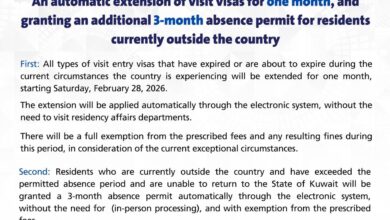Expatriate license ban flouts legal standards, warn critics
Lawyers Bassam Al-Asousi and Fahd Al-Bassam stated that the circular is tainted with illegality due to its violation of the law, as well as the illegality related to the party that issued the decision.

-
Lawyers Bassam Al-Asousi and Fahd Al-Bassam said that the Administrative Circular No. 11 of 2024, issued by the Kuwaiti Ministry of Commerce and Industry on the 5th of this month, violates legislative principles and falls significantly below the standard of the law.
-
The circular stipulates that no resident or expatriate, whether a partner or manager, may be entered into the commercial register except after ensuring that they fall under Article 19, in accordance with what was stated in Manpower Book No. 2802 dated 3/1/2023.
Lawyers Bassam Al-Asousi and Fahd Al-Bassam confirmed that Administrative Circular No. 11 of 2024, issued by the Kuwaiti Ministry of Commerce and Industry on the 5th of this month, violates legislative principles and falls significantly below the standard of the law, according to Al Jarida newspaper.
Al-Asousi and Al-Bassam told Al-Jarida newspaper that the circular addressed higher legislation, represented by the Commercial Companies Law and the Trade Law, which are responsible for setting the conditions and mechanisms necessary for establishing companies and practicing trade in Kuwait.
They stated that the circular is tainted with illegality due to its violation of the law, as well as the illegality related to the party that issued the decision.
The two lawyers refuted the legality of the aforementioned circular and its consequences as follows:
First: Legislation rules and Circular No. 11 of 2024
Legislation has established principles and rules that are considered part of the public order and must not be violated. Among these principles is that a lower authority in the ranks of legislation may not cancel or amend a legal rule established by a higher authority, nor add new provisions to it, except with special authorization from this higher authority or from the law (Article 2 of the Civil Code).
On August 5, newspapers published Circular No. 11 of 2024, issued by the Acting Undersecretary of the Ministry of Commerce and Industry, regarding the temporary suspension of the establishment, renewal, and amendment of all companies and institutions.
The circular stipulates that no resident or expatriate, whether a partner or manager, may be entered into the commercial register except after ensuring that they fall under Article 19, in accordance with what was stated in Manpower Book No. 2802 dated 3/1/2023.
The circular confirmed the suspension of all existing licenses in which one of the partners or managers does not fall under Article 19 based on the partners’ incompatibility.
According to the legal rule referred to above, the aforementioned circular violated legislative principles. The circular, which is at a much lower level than the law, addressed higher legislation represented by the Commercial Companies Law and the Commercial Law, which are responsible for setting the conditions and mechanisms necessary for establishing companies and practicing trade in Kuwait.
The former sets the conditions for establishing companies of all kinds and among these conditions is not specifying the residence of the foreign partner (expatriate), which the circular addressed. The latter did not set restrictions related to the residence of the expatriate (foreigner) practicing trade, and only stipulated, under Article 23 thereof, that the expatriate must have a Kuwaiti partner, and that this partner’s share must not be less than 51 percent of the capital of the company with a foreign element.
These provisions are among the general principles on which the economic system in Kuwait is based. They also relate to a general and fundamental interest of the community and are therefore considered matters related to public order.
Consequently, an agreement concluded in violation of them is subject to absolute nullity. If the legislator had intended to specify residence as a condition for expatriates to practice trade, it would have been stated in Article 23.
The aforementioned circular was issued based on a letter from the Public Authority for Manpower to the Ministry of Commerce, stating that it is not permissible to combine the status of employer and worker for the same person. This is an inaccurate criterion since the company, as the employer, has its own legal personality and financial liability independent of its partners. It is not necessary for a partner to be a worker in the company.
This standard set by the circular constitutes an amendment to a legal provision, which the issuing authority does not possess without authorization from the law, rendering it legally ineffective and invalid for reliance.
It is established that a lower authority in the ranks of legislation may not cancel or amend a regulatory rule set by a higher authority, or add new provisions to it, except with special authorization from this higher authority or from the law.
As this is the case, the decision (circular) issued by the Undersecretary of the Ministry of Commerce and Industry is tainted with the defect of illegality, as it violates the law in the aforementioned detail, in addition to the illegality related to the party that issued the decision, which is referred to as “the defect of usurpation of authority or lack of jurisdiction.”
What was issued by the Undersecretary of the Ministry of Commerce and Industry—by adding a new condition for establishing companies with a foreign element, specifically requiring compliance with the residence article (Article 19) as a condition for the partnership of the expatriate and for their practice of trade—constitutes legislation from an incompetent authority. This represents a violation of the principle of separation of powers stipulated in the Constitution.
Second: From the economic point of view
Economists have warned of the effects of implementing this circular, highlighting a serious danger that will harm the Kuwaiti economy. Its enforcement will lead to the suspension of about 45,000 companies, negatively impacting market activity.
Additionally, expatriates may dispose of their shares if they are unable to adjust their status, resulting in the loss of their rights and providing false indicators of market activity. Accordingly, this circular is invalid in all respects, nullifies its effect, and must not be implemented.
Existing legal positions remain as they are until the legislator intervenes to amend the legislative texts related to foreigners owning shares in Kuwaiti commercial companies and practicing trade, in accordance with the constitution and the law.












